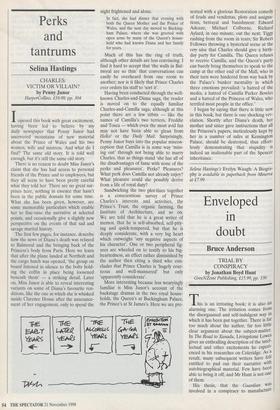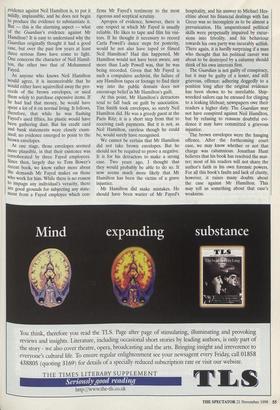Enveloped in doubt
Bruce Anderson
TRIAL BY CONSPIRACY by Jonathan Boyd Hunt GreeNZone Publishing, £15.99, pp. 336 This is an irritating book; it is also an alarming one. The irritation comes from the disorganised and self-indulgent way in which it has been put together. There is far too much about the author, far too little clear argument about the subject-matter. In The Road to Xanadu, Livingstone Lowes gives an enthralling description of the intel- lectual and other excitements he experi- enced in his researches on Coleridge. As a result, many subsequent writers have felt entitled to pad out their narrative with autobiographical material. Few have been able to bring it off, and Mr Hunt is not one of them.
His thesis, that the Guardian was involved in a conspiracy to manufacture evidence against Neil Hamilton is, to put it mildly, implausible, and he does not begin to produce the evidence to substantiate it. But — this is the alarming aspect — what of the Guardian's evidence against Mr Hamilton? It is easy to understand why the Guardian originally thought it had a good case, but over the past few years at least three serious flaws have come to light. One concerns the character of Neil Hamil- ton, the other two that of Mohammed Fayed.
As anyone who knows Neil Hamilton would agree, it is inconceivable that he would either have squirrelled away the pro- ceeds of the brown envelopes, or used them solely to purchase expensive items. If he had had that money, he would have spent a lot of it on normal living. It follows, therefore, that while he was flashing Fayed's used fifties, his plastic would have been gathering dust. But his credit card and bank statements were closely exam- ined; no evidence emerged to point to the brown envelopes. At one stage, those envelopes seemed more plausible, in that their existence was corroborated by three Fayed employees. Since then, largely due to Tom Bower's recent book, we know rather more about the demands Mr Fayed makes on those who work for him. While there is no reason to impugn any individual's veracity, there are good grounds for subjecting any state- ment from a Fayed employee which con- firms Mr Fayed's testimony to the most rigorous and sceptical scrutiny.
Apropos of evidence, however, there is one respect in which Mr Fayed is usually reliable. He likes to tape and film his visi- tors. If he thought it necessary to record Carla Powell's dance steps for posterity, would he not also have taped or filmed Neil Hamilton? Had this happened, Mr Hamilton would not have been aware, any more than Lady Powell was, that he was being recorded. Given that Mr Fayed is such a compulsive archivist, the failure of any Hamilton tapes or footage to find their way into the public domain does not encourage belief in Mr Hamilton's guilt.
At this point, Mr Hamilton's detractors tend to fall back on guilt by association. Tim Smith took envelopes, so surely Neil Hamilton did. He was a greedy guest at the Paris Ritz; it is a short step from that to receiving cash payments. But it is not, as Neil Hamilton, careless though he could be, would surely have recognised.
We cannot be certain that Mr Hamilton did not take brown envelopes. But he should not be required to prove a negative. It is for his detractors to make a strong case. Two years ago, I thought that they would probably be able to do so. It now seems much more likely that Mr Hamilton has been the victim of a grave injustice.
Mr Hamilton did make mistakes. He should have been warier of Mr Fayed's hospitality, and his answer to Michael Hes- eltine about his financial dealings with Ian Greer was so incomplete as to be almost a prevarication. His unquestioned political skills were perpetually impaired by excur- sions into frivolity, and his behaviour towards his own party was incurably selfish. There again, it is hardly surprising if a man who thought that his political career was about to be destroyed by a calumny should think of his own interests first.
The Guardian is not guilty of conspiracy, but it may be guilty of a lesser, and still grievous, offence: adhering doggedly to a position long after the original evidence has been shown to be unreliable. Ship- wrecked sailors can be excused for clinging to a leaking lifeboat; newspapers owe their readers a higher duty. The Guardian may not have conspired against Neil Hamilton, but by refusing to reassess doubtful evi- dence it may have committed a grievous injustice.
The brown envelopes were the hanging offence. After the forthcoming court case, we may know whether or not that charge was calumnious. Jonathan Hunt believes that his book has resolved the mat- ter; most of his readers will not share the author's faith in his own forensic powers. For all this book's faults and lack of clarity, however, it raises many doubts about the case against Mr Hamilton. This may tell us something about that case's weakrii'ss.



















































































 Previous page
Previous page